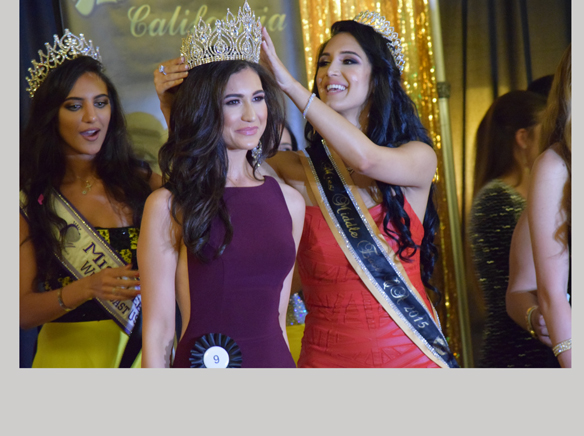Once again, the Chaldean American Chamber of Commerce took the Miss Middle East USA Scholarship Pageant to new heights. With 12 contestants, each representing their own ethnic community, it was a night of elegance, some surprises, but most of all, a night of shining a light on the ability to empower American Middle Eastern women. And this has been the goal of Chamber president and founder of the Miss Middle Eastern USA pageant Ben Kalasho since its conception.
Once again, the Chaldean American Chamber of Commerce took the Miss Middle East USA Scholarship Pageant to new heights. With 12 contestants, each representing their own ethnic community, it was a night of elegance, some surprises, but most of all, a night of shining a light on the ability to empower American Middle Eastern women. And this has been the goal of Chamber president and founder of the Miss Middle Eastern USA pageant Ben Kalasho since its conception.
Held at the Hilton Mission Valley on May 19, the ballroom was filled to capacity with nearly 500 people waiting to find out who would be the third winner of what is now the largest ethnic pageant in America, perhaps the world. And there were no disappointments. It was a night of celebration and delight as people from all ethnic backgrounds came together, not only for the party and to see who won, but for unifying in the common message that this particular pageant portrays to the world.
And the 12 contestants were all extraordinary in every single way. One by one, they introduced themselves in casual wear, giving people a glimpse of who they are off the pageant stage. A favorite, the ethnic fashions, which portrayed the proud heritage of the ethnic community they represented and the heritage showed graciously through beautiful works of fashion, each with meaning and purpose. After answering some tough questions from a large panel of celebrity judges and the graceful display of astonishing evening gowns, the audience was in for a surprise, when the Top 5 turned into the Top 7 due to a three-way tie. This prompted more questions from the judges, but in the end, it was Zhala Tawfiq, representing the Kurdish community, an El Cajon Valley High and UCSD graduate who reigned in the title of Miss Middle East USA 2016.
Kalasho said the event was unexpectedly well attended and that the overall message was well received. He said after the pageant, many people came to him and told him that they understood why this pageant is important to the American Middle Eastern communities as a whole.
“No other organization, no other time, no other moment are you able to find Middle Eastern people from various countries, religions and backgrounds come together under one roof,” he said. “This never happens. I have never been to an event like this where you have Persians sitting with Palestinians, Israelis, Kurds, Chaldeans, and Jordanians.”
He said something happened this year before the pageant that he could only describe as amazing. As he was running back stage in the middle of the chaos of making sure the pageant was ready to go he witnessed something he had never seen before.
“The girls were saying a Muslim prayer and a Christian prayer at the same time. It was a moment that sent goose bumps down my back because countries can’t do this. But these girls, who just met each other two weeks ago, they are holding hands, and saying their prayers together,” he said.
Kalasho said word has spread like a wildfire with this pageant, only in its third year, becoming the largest ethnic pageant in world. So they reached out to some of the Middle Eastern celebrities, and people like Quinton Aaron, “The Blind Side,” who really did not know what to expect, but afterwards understood and loved the message that the pageant represents. Many of them agreed as soon as they saw videos of the former pageants held.
“They want to be a part of it and they want to be part of making history, and I think we did that,” he said. “We were able to get celebrities, movie stars, reality stars, dignitaries and this is just the beginning. Who knows what’s going to happen next year. We’ve already started reaching out to people.”
As the founder of the pageant, Kalasho said this pageant is one way in taking a stance against conservatism with respect to how conservatism is played out in the Middle Eastern culture to oppress women.
“I’m not just talking about Islam,” he said. “Even in the Christian and other communities. When we think of conservatism here in the West, it’s completely eclipsed by what conservatism means in the Middle East. You are talking about women in most countries that aren’t able to show their hair, their face, they aren’t able to drive and the laws are so skewed against them that it makes it impossible for them to have basic human rights, like driving, voting, being able to give testimony in court. They cannot be equal to men.”
He said this beauty pageant showcases beauty by exposing their hair, outer beauty, inner beauty, intellect and its purpose is to demolish that conservatism.
“It gives them the chance to say that they are not going to be talked down to, they are not going to be taking the back seat in the shadows, ‘we are just as equal to men,’” he said. “I believe the most oppressed people in the world are Middle Eastern women.”
Even in the American Middle Eastern culture, it takes a lot of courage for these young women to step out publically and announce that they are educated and will not settle for anything less than making a difference in this world and in the way that women are treated. Although many of them are American, they are still bound by old cultural traditions of oppression that have been passed down through generations. Kalasho said four days before the pageant, one contestant dropped out because her family made her drop out, even after spending a lot of time and money to prepare for the pageant.
“They made her drop out because they said she was wasting her time, that the community was going to shun her,” he said. “Basically black listed. And she is not a stay at home girl. She has a job, she makes her own money, but yet she does live at home and it’s a cultural thing. In our culture, it’s not like they move out when they are 18, they stay until something happens. I spoke with her after the pageant and she was crying. She really wanted to branch out and grow. And now her family is wanting to see her married in the next month or two because she rebelled by entering the pageant. Now they are trying to marry her off.”
And these are the reasons that the Miss Middle East USA pageant exist and will continue to do so. It not only breaks the boundaries of assimilation into American society and culture, but is meant to empower Middle Eastern women who still fight some form of oppression here in America and gives hope to those abroad. Although the pageant is filled with glamour, glitz and extravagance, these are effective tools in breaking the cycle in the oppression of Middle Eastern women today.
And this year’s Miss Middle East USA Zhala Tawfiq, along with her predecessors Miss Middle East 2015 Elona Brando (Assyrian community) and Miss Middle East 2014 Stephanie Malouf (Lebanese community) are some of the women that are shattering cultural oppression, just by competing and representing their ethnic communities proudly and with purpose.















Appreciate it for this post,
Appreciate it for this post, I am a big fan of this site would like to
go along updated. http://minlnk.me/magnetiquehairregrowth685618
I’m curious to find out what
I’m curious to find out what blog system you’re using?
I’m having some minor security issues with my latest site
and I’d like to find something more secure.
Do you have any suggestions? http://hardingemarketinglibrary.com/UserProfile/tabid/43/UserID/549706/Default.aspx
Excellent weblog right here!
Excellent weblog right here! Additionally your web site
lots up very fast! What host are you the usage of? Can I
am getting your affiliate hyperlink in your host?
I want my site loaded up as fast as yours lol. http://catswithbamboochopsticksforhands.com